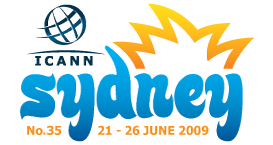Joint SO/AC Public Meeting
SESSION SUMMARY
Representatives of ICANN’s Supporting Organizations and Advisory Committees met and discussed institutional improvements. A summary is provided below:
Frustration and exhaustion
There is a huge volume of work and everyone struggles to get through it and so stay up to date on issues.
There is a lack of visibility of the impact that volunteer input has on decision making, particularly for Board decisions.
Also:
- The purpose, roles and responsibilities of volunteers, staff and Board are not clear.
- Levels of trust are low.
- The Board operates at too operational a level
- The current processes are not scalable, particularly as the organization continues to grow and internationalize.
Possible solutions to these issues were raised:
- Prioritization of the workload
- Better scoping of issues at the start of policy processes. This should involve all SOs and ACs.
- Improving accessibility to issues by providing summaries
- Working together to clarify purpose, roles and responsibilities
- Leaders acknowledging that building trust is part of their role
- Taking time to analyse the root cause of the frustration
- Improve contact between groups, perhaps through issue-focussed meetings
There was recognition that there is much good work being done by staff and volunteers and that there has been significant improvement over the last few years. The frustration expressed can also be seen as a positive energy for change (although a complete evolution and reform process was not seen as the best solution).
There are existing processes in which some of these issues may be tackled. The strategic planning process (http://www.icann.org/en/strategic-plan/); review of the policy development process (https://st.icann.org/icann-ppsc/index.cgi?pdp_team); and the improving institutional confidence consultation (http://www.icann.org/en/jpa/iic/).
What it is | The joint meeting of ICANN’s Advisory Committees and Supporting Organizations, known as the ACSO session, was developed by the chairs of the different groups in 2008 to fill a gap at ICANN meetings that they felt existed.
In particular, the chairs:
- Wanted to find a formula for open communication that was more than a repeat of existing open microphone sessions
- Wanted to create a forum that could break through the silos of discussion and communication in which ACs and SOs often operate
- Wanted the opportunity to discuss topics of mutual interest and importance, and to have those topics suggested by ACSO members
To this end, it was agreed that:
- It is better to hear things "from the horse's mouth" i.e. direct communication is always going to be more effective than indirect communication
- Some existing meetings between individual ACs and SOs could benefit from being expanded to other groups within ICANN. By enlarging the conversation, not only would time and effort be saved but other groups would be in a better position to understand and reflect upon different AC and SO perspectives
- It was important to have a physical demonstration of the whole community coming together to exchange views and information
- That a joint "ACSO session" be its own standalone meeting and not replace other sessions, with the possible reduction in bilateral sessions between particular ACs and SOs
Why it's Important | Representatives from right across the organization meet to discuss a pressing topic and increase understanding of different perspectives across the community.
Who should attend? | Everyone that can.
AGENDA
The ACSO session will have as its focus the following topic:
Institutional Improvements
The roles and responsibilities of ACs, SOs, Policy Staff and Board in ICANN's processes: current situation and possible evolutions
This topic will be explored within the current context of where ICANN is an organization, particularly: current practices and their contribution to transparency and accountability; ongoing independent reviews of the ACs and SOs and the subsequent reorganizations; the Improving Institutional Confidence (IIC) consultation that followed the midterm review of ICANN's Joint Project Agreement (JPA) with the US government; and the current review of the JPA that is underway.
The Chairs of each of the ACs and SOs would like to note that discussing the current systems in place does NOT imply any implicit criticism of either the community or the staff. The aim of the discussion it to identify areas of improvement.
Instead, the Sydney meeting provides a unique opportunity to take at look at some of the practical aspects of ICANN's continuing internal effort to improve institution confidence.
Current community topics that the conversation is expected to touch upon include:
- The ongoing independent reviews of the different parts of the ICANN model
- The Improving Institutional Confidence consultation and recommendations
- The conclusion of the Joint Project Agreement with the US government in September
Specific questions that will be explored include:
1. Roles and responsibilities of the ACs, SOs and Policy staff:
a. What should these roles be?
b. What is the right balance between volunteer activity and policy staff activity?
c. Is the current balance correct or should it be altered?
d. Does the current balance lead to volunteer exhaustion?
e. Would shifting the balance diminish the degree of private bottom-up policy making?
2. Policy staff as Board intermediary:
a. Should all communications between the SOs be moderated by Policy staff?
b. Should there be direct communication between the Councils and the Board?
3. Board communication with Advisory Committees:
a. Should all ACs have the same rights in terms of recommendations and response by the Board to their issues?
4. Transparency of communications:
a. Should staff communications to the Board be confidential?
b. Should communications regarding AC or SO activities be confidential?
c. Which other communications need to remain confidential?
d. What would be the effect of making most communications between staff and the Board open to community review?













